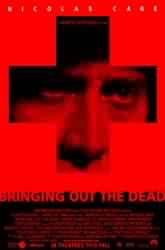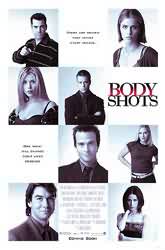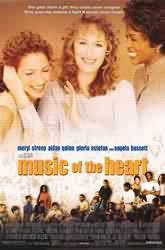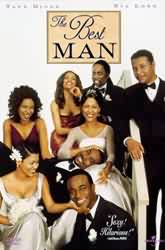 |
Bats (Dir: Louis Morneau, Starring Dina Meyer, Lou Diamond Phillips, León, Carlos Jacott, Bob Gunton, and James Sie) more BY: DAVID PERRY |
| Cinema-Scene.com > Volume 1 > Number 34 |
Cinema-Scene.com
Volume 1, Number 34
 |
Bats (Dir: Louis Morneau, Starring Dina Meyer, Lou Diamond Phillips, León, Carlos Jacott, Bob Gunton, and James Sie) more BY: DAVID PERRY |
Just last week I wrote about a film entitled The Omega Code, telling of how it might be fun to just see it to make fun of. I even gave The Omega Code a D- as opposed to a F simply because I had so much fun (especially with Michael York's performance), but the campy fun is not even present in Bats. Both are bad films, poorly written, poorly acted, altogether poorly made, but what makes the difference is that The Omega Code is made as if it is really trying to be a real action film, while Bats is self mocking. I went through this same thing with Phantoms and Desperate Measures early in 1998, where I found Phantoms more watchable since it was really trying to be good, while Desperate Measures was trying to be bad and see how people would enjoy some self-mockery. This is the whole reason that Ed Wood film are so great to watch, or Manos: The Hands of Fate, it is funny just how inept they are. Let's face it, few people beyond Roger Corman can make self-mocking bad films so well.
Bats is just as bad as its trailers made it look. I've seen some bad films, so I think I'm near an expert on bad films and this was pretty bad. Every minute detail about the film was poor. Plus it was a comedy trying to show how bad the genre is, but not working as a comedy or an action film. Bats is just all-out bad.
The film is about some mutated bats that are spreading across the southwest, killing people and cars in their way. The government sends for a bat expert (Meyer) who they think might help to find the root of the problems and stop it from spreading across the North American continent. The bats are mainly attacking one small town in Texas, where the local sheriff (Phillips) takes it upon himself to help her try to stop the animals from killing everyone.
So far this year I'm at a division on the worst film of
the year, trying to decide between Existo and Detroit Rock City, so this
film is not the worst so far this year. The direction is about as novice looking as Glen
or Glenda and the writing is almost as bad (pretty sad since screenwriter John Logan
is getting pretty good word of mouth with his RKO 281 and Any Given Sunday
scripts). Even though the film is free from worst film honors, that cannot be said for its
lead actor. Lou Diamond Phillips gives a performance that even Edward Furlong would look
down upon. Most of the cast walks through the screenplay, but it takes an awful actor like
Phillips to try and look so bad. Bats is easily the worst action film of the year
so far, and that means I'm saying it is worse than Universal Soldier: The Return.

| BUY THIS FILM'S FROM AMAZON.COM |
REVIEWS OF THIS FILM |
 |
Bringing Out the Dead (Dir: Martin Scorsese, Starring Nicolas Cage, Patricia Arquette, John Goodman, Ving Rhames, Tom Sizemore, Marc Anthony, Cliff Curtis, Mary Beth Hurt, and Aida Turturro) more BY: DAVID PERRY |
There are many reasons that I have become a film critic. One thing is that I am aspiring film director, hoping to spend some time in the lights of modern films, so that I might have my own creations released to a wide audience one day. Another reason is that I have spent years working with films as both resource expert and historian. But the main reason is in one word: directors. I have grown up looking up to all kinds of filmmakers, viewing, studying, and telling of their works. Whenever I'm asked the five things that define me as both a film critic and a filmmaker I always answer Alfred Hitchcock, Stanley Kubrick, Ingmar Bergman, Martin Scorsese, and David Lean. Those five people have made films that have changed me as a person. But the thing is that four out of five have been either dead or semi-retired throughout my lifetime. The only one that has been prolific while I grew up was Scorsese. His films have defined my entire generation of avid film viewers with modern classics like The Last Temptation of Christ, After Hours, GoodFellas, The King of Comedy, Mean Streets, Taxi Driver, and Raging Bull. In fact I'd say, and I'm sure I'm not alone on this, that I have never disliked a Scorsese film. That s still true with Bringing Out the Dead.
Bringing Out the Dead is not Scorsese at his best (interesting since this was written by Affliction director Paul Schrader, who wrote Taxi Driver, The Last Temptation of Christ, and Raging Bull for Scorsese), not quite a GoodFellas or even a Casino, but the film still delivers a great pleasure. It's frantic and crazy, not quite a normal place for the more laid back Scorsese film, but it works for what the story is about. Telling the story of the descent into madness that occurs to a New York ambulance driver (Cage), the film finds the right beat by being crazy. The off-beat scenarios that the driver Frank Pierce goes through are so off the wall that any distant direction of it would not work. Scorsese and cinematographer Robert Richardson know what they are doing and do it right. When Frank finds himself obsessed with a woman (Arquette) whose father he saved (an interesting change from what happened in Eyes Wide Shut), Scorsese throws him into her path on a regular basis so that the story can grow, a slight change of pace from the way he had Travis Bickle interact with Jodie Foster and Cybil Shepherd in Taxi Driver.
One thing that I found most interesting about the film is that it shows Frank paired with three different partners, each one with their own personality. The John Goodman and Ving Rhames partners are both interesting, but the one that interested me the most was Tom Sizemore as burning fuse Tom Walls. Sizemore put so much anger and uneasiness in the character that I found more in this performance than any other in the film, even the unbelievable Cage.
Scorsese is on the right track with the film, but he
still does have some problems. The film is way too long. Sure there is quite a bit to say,
but most of it is said within the first hour, leaving the second, for the most part,
rather repetitive. Scorsese uses music well in the film, he just uses it too much,
repeating the same three or four songs over and over. Scorsese directs the film so well
that it is easy to forgive him for any and all mistakes. As a film Bringing Out the
Dead is great, for a Scorsese film it is lackluster.

| BUY THIS FILM'S FROM AMAZON.COM |
REVIEWS OF THIS FILM |
 |
Body Shots (Dir: Michael Cristofer, Starring Sean Patrick Flanery, Tara Reid, Jerry O'Connell, Amanda Peet, Ron Livingston, Emily Procter, Brad Rowe, and Sybil Tenchen) more BY: DAVID PERRY |
Body Shots
(Dir: Michael Cristofer, Starring Sean Patrick Flanery, Tara Reid, Jerry O'Connell, Amanda Peet, Ron Livingston, Emily Procter, Brad Rowe, and Sybil Tenchen)
I can hear the hate mail being written right now, but there are some occurrences in which the male side of me can take me into a film. I'm not alone in this, look at Siskel & Ebert through the years, almost always adoring films with sexual content (Bliss, Female Perversions, Wild Things, Kama Sutra, all sex films that were recommended by the pair, despite being hated by most of the mass media). I'll be first to admit, as I'm sure Roger Ebert would too, that one of the main reasons to watch Wild Things is for that scene near the middle, it's just the truth. Still my chauvinism does not always change my feelings on a film. I did dislike Radio Inside, Bliss, Paris, France, Kama Sutra, and Wide Sargasso Sea, but of course I did give minor recommendations to Wild Things, Cruel Intentions, and Palmetto (though now that I think about it, I'm not sure that there was any nudity in Palmetto). Body Shots was a film that I looked forward to simply because it looked like Wild Things, but I knew that when it came time to review it, I would have to put all male predisposition behind me. Guess what, any way you put it, I still was not enthralled by the film.
Body Shots is a Rashomon type story about the memories of one night in the lives of six Angelinos. All are rather upper-middle, if not upper class, in their twenties with nice well-liked jobs. I'm a bit forgetful, but I'll stick to the jobs that I remember. There are four girls, each one seeing themselves as rather attractive woman that enjoy sex. The one that is self loathing is a follower, interestingly the first one to have sex in the film. The four guys are all sure of themselves sexually, especially the one that seems the most unattractive, but lacks nothing in the delusions of grandeur. The night is filled with alcohol and sex, and the films follows each individual as they remember what those two factors did to them. The occurrence that holds most of the film is the supposed raping of the actress (Reid) by the football player (O'Connell), a fight that divides each side of the gender barrier.
The film is overwrought and overstylistic. The Real
World type monologues that have been too omnipresent since When Harry Met
Sally... took that approach was offsetting, leaving little too be cared about on the
part of the individuals. The direction and screenplay (by American History X scribe
David McKenna) are less than enthralling, giving moments of wanted tension about as much
interesting moments as watching an old lady feed pigeons (see if you can find a better
simile). The young cast is rather unable to work, giving novice performances that are
rather starchy. Still I did not truly hate the film. It did have some redeeming moments
(and I'm not just talking of the sex scenes), but not enough to even get a mixed review.
It might have helped had the nudity been a little better...just kidding.

| BUY THIS FILM'S FROM AMAZON.COM |
REVIEWS OF THIS FILM |
 |
Music of the Heart (Dir: Wes Craven, Starring Meryl Streep, Angela Bassett, Aidan Quinn, Cloris Leachman, Gloria Estefan, Jay O. Sanders, Josh Pais, Charlie Hofheimer, Kieran Culkin, Michael Angarano, Henry Dinhofer, and Jane Leeves) more BY: DAVID PERRY |
Where is the world going. I think it is official, the entire world is going to end at the change of the millennium. There are things already happening that reach the greatest amount of absurdity. David Mamet (a.k.a. Mr. "Fuck You") and the king of the surreal David Lynch made G rated films this year. Not to mention the fact that a first time film from a play director is better than a Kubrick film. Then there is one thing that irks me almost more than the others ("almost" because I can't get over Mamet and Lynch going G) is that two men that are known for their expertise in horror films are making steps in completely different genres. Earlier this year, the creator of the Evil Dead trilogy, Sam Raimi, made a insipid romantic drama with For Love of the Game, proving that he should stick to his own genre. Now the man that introduced Scream, A Nightmare on Elm Street, and The Last House on the Left is making a warm hearted drama. At least when Raimi made a drama last year, it was dark and disturbing. The Wes Craven drama is pure sap (as well as pure Mr. Holland's Opus, Blackboard Jungle, To Sir, with Love, Lean on Me, et al.), with little else, at least until its last half.
Music of the Heart is a dramatization of the true story of Roberta Guaspari, a dedicated East Harlem violin teacher who attempted to keep the music in the inner city schools. The film starts off with Roberta (Streep) in financial and emotional strife over her husband leaving her for a friend they had shared. Instead of living with her caring mother (Leachman), she and her two children (at this point in the film, Angarano and Dinhofer) head to East Harlem where Roberta has picked up a substitute teacher of violins thanks to a Brian (Quinn), an old friend. The first hour deals with Roberta teaching the first group of fifty children to play the instrument and dealing with an ill fated relationship with Brian. The second half is set ten years later with Roberta still in the school, while teaching the course in three other local schools. But when the music budget is cut, Roberta finds that her position is in danger and she and two friends (Bassett and Estefan) attempt to find a way to stop this from happening.
The first hour of the film is awful to sit through, some of the worst drama I've ever seen, but suddenly everything changes at the second half. When that "Ten Years Later" card comes up, the film also comes up from the hole it had fallen in. With surprising grace, Craven had made a beautiful concert film, making the characters more dimensional, and the actors more at home. I was ready to give the film a D+ or C- from the first half, but the second half changed everything.
Craven does little with the direction in the first half (I know my dividing of the film is a little annoying, but that is actually the only way to look at the film), but he seems to have brightened up in the second. The actors are hit and miss, with Streep and Bassett both giving worthy performances, while Estefan and Quinn are just staggering around.
This is the ultimate mixed review, hating the first half,
adoring the second. Luckily for the film I tend to think the stronger second half is more
important.

| BUY THIS FILM'S FROM AMAZON.COM |
REVIEWS OF THIS FILM |
 |
The Best Man (Dir: Malcolm D. Lee, Starring Taye Diggs, Nia Long, Morris Chestnut, Harold Perrineau Jr., Terrence Dashon Howard, Sanaa Lathan, Monica Calhoun, Melissa DeSousa, and Victoria Dillard) more BY: DAVID PERRY |
The Best Man is part of a genre in the African American film community that I always seem to welcome. I get tired of the gangster films and the meanspirited comedies, so when a light, nice film comes from the community, I'm always happy. It has only happened one time previously this year with The Wood, which I gave a marginal thumb down. The second, and probably only other film in the genre this year is The Best Man, a film I think is flawed, but better than The Wood. The Best Man is one of those My Best Friend's Wedding comedies that work on their own turf. If you're in the mood for Menace II Society, then The Best Man is not the film to see, just like My Best Friend's Wedding as compared to GoodFellas. The fact of the matter is that The Best Man is a likable film that would only be liked by those that like that type of film (I know, too many likes, so sue me).
The film follows what happens when six friends come together to watch two of them get married. The couple is Lance (Chestnut) and Mia (Calhoun); Lance is a football superstar ready to settle down, Mia a supposed monogamous love for the Lance. On the weekend before the wedding, Holden (Diggs) enters. Everything would be fine for the everybody if it was not for the fact that Jordan (Long), an ex-love of Holden, has obtained a preview copy of Holden's semi-autobiographical novel. With his secrets out for everybody to read, the deepest, darkest secret sees light and there is chance that his novel will ruin the wedding.
The film is sweet and fuzzy, and enjoyable in that light. In fact I was rather happy with the film up until the end. The last ten minutes of the film is so predictable, so sappy, so, well, easy. I would have liked to think that the director/screenwriter might have had a little more thought in the project for its entire duration. Instead he fails in the entire messed-up conclusion.
As for the other aspects of the film, Diggs and Long have great chemistry in the film, shining in roles beyond anything I've seen them in before. I thought that Chestnut was a little weak, eating the scenery in every frame. The comic relief of Howard as Quentin was enjoyable, with some moments of being rather routine.
The set-up is great, its just the follow through that
causes this film to get a very marginal thumb down.

| BUY THIS FILM'S FROM AMAZON.COM |
REVIEWS OF THIS FILM |
Reviews by:
David Perry
©1999, Cinema-Scene.com
http://www.cinema-scene.com